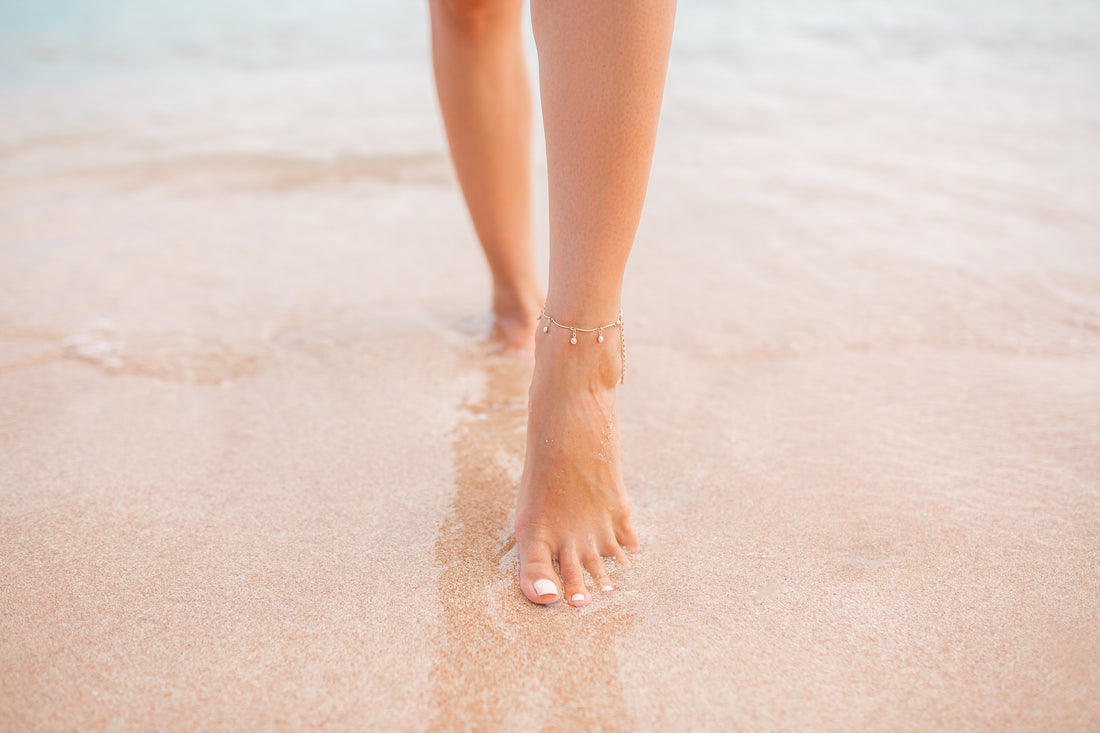
What is Grounding?
Share
Grounding, also known as earthing, is the practice of connecting your body directly to the Earth’s surface. It may seem simple, but this connection can have profound effects on physical and mental well-being. Grounding involves practices such as walking barefoot on grass, lying on the ground, or swimming in natural bodies of water. By reestablishing this connection, you can tap into the Earth's natural energy to balance and restore your body's electrical state.
The Science Behind Grounding
The Earth carries a mild negative charge. In contrast, modern living surrounds us with positive electrical charges from synthetic materials, electronic devices, and electromagnetic fields (EMFs). Grounding works by allowing electrons from the Earth's surface to flow into the body, which can help neutralize free radicals, lower inflammation, and restore balance to your electrical environment.
Scientific studies have begun to explore the potential benefits of grounding, with intriguing results. While more research is needed to fully understand its mechanisms, many believe that grounding can positively influence the body’s electrical and biochemical state.
Key Benefits of Grounding
Grounding offers a wide range of potential health benefits. Here’s a deeper dive into some of the most notable effects:
-
Reduces Inflammation
Chronic inflammation is at the core of many diseases, including heart disease, arthritis, and autoimmune disorders. Research indicates that grounding can reduce inflammation markers in the body. By absorbing electrons from the Earth, grounding may help neutralize free radicals that cause inflammation.
-
Improves Sleep Quality
Many who practice grounding report improved sleep quality. Grounding has been shown to regulate circadian rhythms—the body's internal clock—which helps align your sleep-wake cycle. This leads to deeper, more restful sleep, especially for those with insomnia or jet lag.
-
Lowers Stress and Cortisol Levels
Stress can wreak havoc on both body and mind. Elevated cortisol, the stress hormone, is a common marker of chronic stress. Grounding has been shown to help normalize cortisol levels, which can reduce feelings of stress and anxiety. By walking barefoot outdoors or spending time on natural surfaces, many people feel calmer and more centered.
-
Increases Energy Levels
Fatigue and low energy are common issues in our modern world. Grounding may help rejuvenate your energy levels by facilitating the flow of the Earth’s electrons through the body, which can positively influence cellular energy production.
-
Boosts Immune Function
A strong immune system is essential for fending off illnesses and maintaining health. Grounding has been linked to reduced inflammation and lower levels of stress, both of which contribute to enhanced immune function and overall resilience.
-
Relieves Pain
Chronic pain is a condition that many people endure daily. Grounding may offer natural pain relief without the use of medication. Several studies have highlighted how grounding can reduce pain and stiffness in muscles and joints, as well as alleviate headaches and migraines.
-
Supports Heart Health
Heart health is a top priority for many, and grounding may have a role to play. Research indicates that grounding can improve blood viscosity and circulation, helping to reduce blood pressure and lower the risk of cardiovascular disease.
Practical Ways to Incorporate Grounding into Your Life
Grounding is accessible, free, and easy to practice. Here are some simple and effective ways to incorporate it into your daily routine:
- Walk Barefoot: One of the easiest ways to ground yourself is to walk barefoot on natural surfaces like grass, sand, or soil. Even spending 20-30 minutes a day walking outside can have a significant impact.
- Sit or Lie on the Ground: Find a quiet outdoor spot and spend time sitting, meditating, or lying on the ground. Whether you’re reading, listening to music, or simply relaxing, this direct contact with the Earth can be very beneficial.
- Swim in Natural Water: Oceans, rivers, and lakes provide an excellent opportunity to practice grounding. Water is a powerful conductor of the Earth’s energy, making swimming one of the most effective forms of grounding.
- Garden with Bare Hands: Gardening not only allows you to connect with nature but also provides an opportunity to ground your body through contact with soil.
Common Questions About Grounding
- How long should I ground myself for?
There is no specific time limit for grounding. Some studies suggest that as little as 20-30 minutes of grounding per day can produce noticeable benefits, but more time outdoors can enhance the effects. - Can grounding help with anxiety?
Yes, many people find that grounding helps reduce feelings of stress and anxiety. The calming effect of connecting with nature can help balance cortisol levels and promote a sense of peace and well-being.
- Is grounding scientifically proven?
Yes, several scientific studies have shown positive effects on inflammation, sleep, pain relief, and stress. However, more studies are always welcomed in establishing its full range of benefits.
Bringing Grounding Indoors with Grounding Bed Sheets
While connecting with the Earth outdoors is great, it’s not always practical for everyone. This is where grounding bed sheets come into play. These specially designed sheets connect you to the Earth’s energy while you sleep, providing all of the same benefits as outdoor grounding—from reduced inflammation and improved sleep to lower stress levels—all from the comfort of your own bed. With grounding bed sheets, you can experience the healing potential of the Earth’s energy, even when you're indoors.
